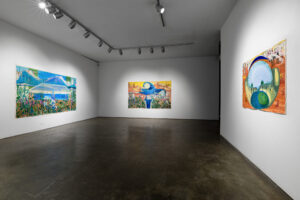In order to to comply with the NYC vaccine mandate regulations outlined in the Key to NYC Pass, proof of vaccination and ID required for entry. Please read our COVID Courtesy Code prior to your visit – face coverings are still required for all visitors regardless of vaccination status.
Farima Fooladi’s paintings depict spaces using memory, compressing architecture and landscape from her upbringing in post-revolutionary Iran with those that surrounded her as an adult after emigrating to the United States. In her newest body of work, the artist combines details from Southern Iran’s arid environment with luscious flora and other specifics of her current home in Houston, TX. The resulting paintings present organic and surreal landscapes that capture the transition of a place between feeling familiar and deeply foreign. The exhibition’s title references Ernest Hemingway’s posthumously published memoir by the same name. In the book, Hemingway famously describes his relationship between place and memory, saying, “If you are lucky enough to have lived in Paris as a young man, then wherever you go for the rest of your life, it stays with you, for Paris is a moveable feast.” Fooladi uses this concept to build a framework for the intrinsic attachment connecting her own memories to the places she has inhabited.
The disjointed visual spaces within the paintings grow out of the artist’s experience observing shifting physical and psychological landscapes during changeovers in political power. Specifically, they recall the architectural uprooting and reconstruction in the wake of the Iranian Revolution, as well as the mental and emotional paradigm shifts in American politics immediately following the 2016 presidential election. Crucially, her works do not represent the events of these traumas but stand as attempts to capture the marks that memory leaves on different geographies over time. Compared with the United States, the landscapes in Iran carry a longer expanse of history, combining buildings more than 1,000 years old with more contemporary elements such as swimming pools and matte glass windows. The paintings stand as tethers between the moments that create a personal history, visually collapsing multiple impressions of time onto a picture plane.
In this body of work, water appears as a motif in the form of pools, waterfalls, and lakes. A resource that is scarce in Iran and abundant in Houston, water continues to play a large role in Fooladi’s most recent series as well as in her previous work. It is a texture and a symbol, referencing specific yet undocumentable recollections as well as its own shifting availability due to climate change. In her newer works, which are more subtle and painterly, Fooladi plays with alienation and distance. The architecture fades into the background of the landscape, and the vegetation is idyllic but just out of reach. These paintings propose a progression of time when one can be certain that more memories will accrue and therefore increase the spatial depth. As Fooladi’s frames continue to expand, the world becomes bigger, more chaotic, and more nuanced through the palimpsests left within the edifice of her memory.
BIO:
Farima Fooladi was born in Tehran, Iran in a transition period from monarchy to the Islamic Republic, and theocracy. She lives in the United States creating paintings in her Studio at the Box13 ArtSpace in Houston, Texas. She teaches studio art courses at Sam Houston State University. Fooladi completed her MFA in Painting and Drawing at Penn State University where she taught drawing and painting for three years before moving to Houston, TX. She is fascinated by the lasting impact of collective trauma caused by invasion, migration, and displacement. She mentions that her paintings are her circumstance.
In her current studio practice she is addressing displacement, delved into different historical and emotional layers of public spaces and memory. The transformation of civic spaces caused by social and political changes is of particular interest to her.
Image: Farima Fooladi, installation view of A Moveable Feast, 2022. Acrylic and oil on canvas and unstretched canvas. Image courtesy of Smack Mellon. Photo: Etienne Frossard, 2022.
This exhibition is supported, in part, by public funds from the New York City Department of Cultural Affairs in partnership with the City Council, New York City Council Member Stephen Levin, and the New York State Council on the Arts with the support of Governor Kathy Hochul and the New York State Legislature, and with generous support from The Andy Warhol Foundation for the Visual Arts, Lily Auchincloss Foundation, Robert Lehman Foundation, Select Equity Group Foundation, many individuals and Smack Mellon’s Members.
Smack Mellon’s programs are also made possible with public funds from the National Endowment for the Arts and with generous support from The Edward and Sally Van Lier Fund of The New York Community Trust, Jerome Foundation, The Roy and Niuta Titus Foundation, Milton and Sally Avery Arts Foundation Inc., and Exploring The Arts. In-kind donations are provided by Materials for the Arts, NYC Department of Cultural Affairs/NYC Department of Sanitation/NYC Department of Education.
Smack Mellon would like to extend a special thanks to all of the individuals, foundations, and businesses who have contributed to the NYC COVID-19 Response & Impact Fund.
Space for Smack Mellon’s programs is generously provided by the Walentas family and Two Trees Management.
